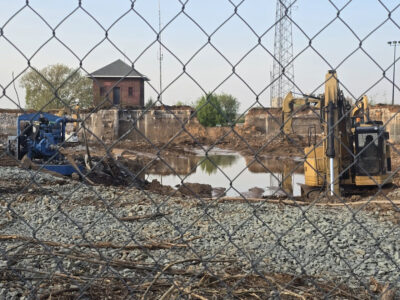Meet Harrington farmer David Marvel, Jr.
The 1,000 acres of farm Marvel tills has been in his family since 1909, though he says his family has been farming the Delmarva Peninsula since 1650. He’s also the vice president of the Vegetable Growers Association of Delaware, where he continues to advocate for improving the ability of local farms to sell directly to local schools.
Marvel is trying to run his business and provide for his family, but downstate Delaware’s infamous internet connectivity issues are limiting his farm’s potential for growth.
“A lot of the access we need is mobile,” he recently said on a panel at a rural broadband forum in Georgetown. “We have areas where we cannot get coverage.”
That coverage is necessary when you’re out in the field using a smartphone to keep up to date on the latest price changes in the produce market. Farmers like Marvel need to access that market analysis without any delay, to know when the time is ripe to move product.
“If my wife says, ‘I love you,’ and there’s a delay in my response, it might cost me quite a bit,” Marvel joked. “It’s not easily accessed.”
As if to rub salt in the wound, Marvel said some of the farmers outside of his immediate family live in a small town in west Nebraska with “one paved street” and “twice the connectivity.” In a way, Nebraska chicken coops are better connected than your average southern Delaware farmer.
“Almost every poultry house I know now is computerized. Any alarm that will go off will send it to a cellphone,” Marvel said. “If [Delaware farmers] had more bandwidth, they’d be able to actually change settings or stop or start something.” And the same goes for irrigation systems — except, according to Marvel, Delaware doesn’t have those because, well, there’s not enough bandwidth in the rural parts of the state.
Marvel said he pays about $200 per month for the service he has now. “I’m not complaining, it’s better than nothing,” he said, adding the fact that he could travel five miles to the local library and access faster internet for free.
And what happens when Delaware gets its annual influx of seasonal migrant farmhands who typically speak English as a second language or don’t speak it at all? “If something happens to a worker in the field, you’ve got to get that person treatment. That’s a challenge,” Marvel said.
“In another month-and-a-half, there will be about 4,000 seasonal migrant workers coming in, and they’ll live and work in rural areas,” he added.
Join the conversation!
Find news, events, jobs and people who share your interests on Technical.ly's open community Slack

Delaware daily roundup: Greentech digital glowups; AI versus dev jobs; New Biggs Museum website

Delaware daily roundup: Free biz analytics tool; AI tools for HR; Goodwill's recycling plan

Delaware daily roundup: Vital conditions framework; Seaford center breaks ground; Staff shortage at the beach

